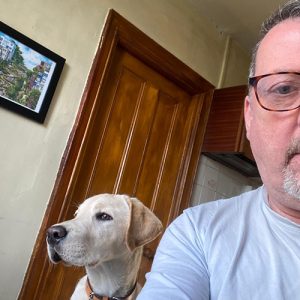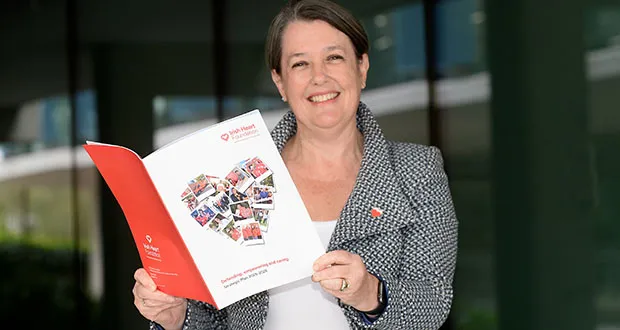Perhaps the answer to behavioural addictions is not a new app or policy but the simple rediscovery of sitting still and doing nothing without panicking, writes Terence Cosgrave
This wet and rather damp island has long prided itself on producing saints, scholars and the occasional Eurovision winner, now finds itself producing something rather less glamorous: behavioural addictions.
Once upon a time, people’s vices were comfortingly straightforward—drink, tobacco, maybe a bit of cannabis if you were lucky, and the odd flash of knickers or knockers on Benny Hill. Sweet, innocent days indeed.
Now the country has upgraded to addictions involving smartphones, screens, sports apps, social media dopamine loops, and other inventions clearly designed by a committee of sleep-deprived Silicon Valley types who think human beings are experimental rats with better shoes – all being guided down internet corridors towards…profit for them.

Terence Cosgrave and pup
You can see evidence of Ireland’s behavioural addiction boom everywhere. Just stroll through any town. There you’ll find people walking while scrolling furiously, occasionally glancing up only to avoid death by lamppost.
In cafés, couples sit in silence, communicating exclusively through Instagram stories that can be seen by thousands but not, apparently, by the person sitting three feet away.
Teenagers are permanently affixed to consoles – their thumbs have the musculature of Olympic athletes, while the rest of them resembles lightly animated laundry.
Middle-aged men now spend more time on betting apps than they do speaking to spouses, causing bookmakers to enjoy record profits and spouses to enjoy record irritation.
But the people who really see the full impact—who experience this national nervous breakdown up close—are doctors. Particularly the poor souls in Emergency Departments and Primary Care. These men and women, who already spend their days ricocheting between chest pains, broken hips and the occasional person with a foreign object lodged in a place that defies both medicine and polite conversation, must now face a new plague – the walking wounded of the digital age.
Emergency Departments have noticed a steady rise in injuries caused by what medical professionals delicately call ‘near total ignorance of one’s surroundings’. These include the classic ‘fell down the stairs while filming a TikTok’, the seasonal favourite ‘got concussion trying to take a selfie with the Christmas lights’, and the emerging trend ‘sprained wrist swiping right with excessive enthusiasm. Once, A&Es were crowded with honest, old-fashioned calamities—accidents involving slurry pits or enthusiastic participation in GAA matches. Now they are filled with people injured while trying to live their best digital lives.
Doctors, naturally, are expected to fix all this. Ireland has a touching national habit of assuming doctors can fix anything. A GP is meant to be part physician, part social worker, part priest, part amateur electrician (people will bring their medical professional malfunctioning hearing aids, toasters, or, in one case I witnessed, a Fitbit that had started speaking Welsh). The idea that a GP could stop behavioural addiction is charmingly optimistic—roughly akin to believing one could end climate change by turning off the immersion.
Yet the requests come all the same. Doctor, my son won’t get off the Xbox. Doctor, my daughter can’t sleep because she thinks she’s missing Instagram content. Doctor, I can’t stop refreshing the news even though nothing new has happened since 2009. These are all genuine concerns, of course. But asking a GP to solve them is like asking an exhausted fireman to put out a wildfire with a Super Soaker.
Consider the daily workload of Ireland’s GPs. They already manage chronic illness, acute illness, mental health issues, vaccinations, medication reviews, elderly care, young children with temperatures that mysteriously vanish the moment they enter the waiting room, and adults who come in with a vague sense of malaise that can best be summarised as ‘the human condition’. To then place the burden of preventing every instance of compulsive smartphone use on their shoulders is both unfair and faintly ridiculous.
Emergency Departments fare no better. They are already the busiest meeting rooms in Ireland—more crowded than the pubs on Christmas Eve and more chaotic than the line for a Tayto sandwich at Electric Picnic. Yet society seems to expect ED staff to deliver hard-hitting psychoeducation on digital dependency between resuscitations. You can almost picture the triage nurse: “Yes, your leg is broken, but more importantly, have you considered a screen-time detox?”
Doctors cannot micro-manage society. They can barely micro-manage their own lunch breaks.
Yet behavioural addictions are real, and they are causing real harm. So what is to be done? The trick, I suspect, is to devise solutions that do not depend on overworked medical staff developing supernatural capabilities.
The first solution is education that doesn’t bore people senseless. Let’s be honest: public health messaging is often about as exciting as a seminar on tax law delivered through interpretive dance. People tune out. What Ireland needs is approachable, witty, slightly cheeky education about managing screen time, gambling apps, gaming and online shopping binges. Something memorable. Something like: ‘Don’t let your phone turn your brain into mashed potato.’ You’d remember that, wouldn’t you, Potato Head?
Second, Ireland could use community-based supports that don’t involve a GP appointment. Parenting courses, peer groups, digital detox workshops in libraries, youth clubs with actual activities (instead of just plugging in more screens), and schools that teach self-regulation as eagerly as they teach the Gaeilge. Imagine a Transition Year programme called “Getting a Grip on Your Brain” — the potential is enormous.
A third approach would be regulation of the more predatory parts of the tech and gambling ecosystem. Not banning things entirely—this usually has all the practical effect of telling a teenager not to touch the biscuits—but nudging companies toward safer design. Features like endless scrolling, personalised gambling triggers and app-based ‘loot boxes’ have been cleverly engineered to turn the human brain into a slot machine. The government could lean on tech companies to incorporate friction: ‘Are you sure you want to watch eight more hours of crime documentaries? Press OK to confirm your questionable life choices.’
Fourth, let us not underestimate the power of architecture. In workplaces, community centres, gyms, even hospitals, Ireland could design more ‘phone-free’ social spaces. In cafés, we might bring back that marvellous 2018 trend of giving discounts to people who left their phones at the counter. In parks, we could install giant Wi-Fi dead zones—places where people could walk without compulsively checking whether someone liked their photo of last night’s dinner.
Finally—and this is my boldest suggestion—we need to re-learn the art of boredom. Boredom is not dangerous. It is the breeding ground of daydreams, creativity, conversations, and, occasionally, the urge to clean the kitchen. Modern Ireland is terrified of boredom – every idle second must be filled with a beep or a buzz. But perhaps the answer to behavioural addictions is not a new app or policy but the simple rediscovery of sitting still and doing nothing without panicking. Zen ve vill be free!
In truth, behavioural addictions are not a sign that Ireland is falling apart. They are a sign that Ireland is human, and humans are exceptionally good at forming attachments to anything that distracts them from the general absurdity of life. We are flawed creatures, stumbling about trying to make the most of things, sometimes falling down the stairs while taking a selfie. Doctors, bless them, will always patch us up—but it’s a bit of a cop-out to ask them to also fix the world.
Ireland doesn’t need its GPs to become digital sherpas guiding us to enlightenment. It needs a mixture of education, community supports, cultural nudges, regulation—and a bit of humour. After all, the moment you can laugh at your own compulsions, they lose their grip.
And if you can laugh at them without filming yourself for TikTok, well, that’s progress. Real progress. There’s got to be an app that can chart it. ![]()










